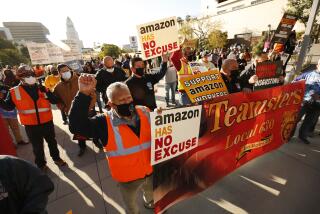Sweet for Execs, Sweat for Others
- Share via
As a former Dilbertina in corporate America, it seems to me that something important is missing in the current efforts to diagnose and treat a very bad case of corruption. The malady is not limited to “a few bad apples,” nor will it yield to new regulations, important as they are.
The infection is systemic, reflecting a 20-year change in corporate culture that converted full-time employees to temporary workers, all but eliminated corporate investment in communities and gutted strong companies to “maximize shareholder value.” The resulting, and temporary, increases in stock prices and reductions in operating costs (at the expense of employees) fueled an obscene rise in executive salaries.
Employees and communities were the immediate losers in the new corporations. Now we see that shareholders can also lose.
Employees once were valued members of a corporate family. They worked an eight-hour day and were paid a fair salary that included a company-paid pension plan and decent medical-dental insurance. They may also have had a 401(k), or one of its predecessors, but this was not a replacement for a traditional pension. In return, most employees willingly gave their best efforts and loyalty. Shareholders received a regular return on investment in the form of dividends. They didn’t have to sell their stock for immediate return and could endure the normal ups and downs of the business cycle, knowing that good companies invested for the future. Both employees and investors were usually in for the long term.
Somewhere in the mid-1980s, “paternalism” gave way to “entrepreneurship.” Of course, corporate managers bear no relationship to true entrepreneurs. But the illusion led many to believe they deserved to live like robber barons and kings. Companies that once referred to employees as “part of the family” became “lean and mean” places of temporary employment, with employees hired and fired as needed. This was sold to employees as “taking charge of one’s career.” Divisions were sold off, producing instant revenue and juicing up executive compensation.
It is no wonder that today’s corporations do not value “older” workers. They know too much. Attention, young people: In the 1930s, people died to establish the eight-hour workday, and until recent years it was the norm. There is something wrong when today’s children are fed packaged dinners by a nanny and parents eat remnants while standing over the sink at 10 p.m. Employers know this.
It was possible to overlook the loss of personal time and such hard-won benefits as company-paid pensions and medical care when it seemed we were all going to be rich. Now that that’s over, perhaps we can rebuild our work environment into something fair.
Dethroning the CEO is a beginning. Prior to the 1990s, extraordinary wealth was the realm of the true entrepreneur--Edison, Ford, Gates, Disney and others who, warts and all, created something of value. Many of today’s CEOs created nothing; at best they managed well what they inherited.
Businesses should start again to reinvest in employees and the community. This was once touted as being good for business and for shareholders. It still is.
Accountants and economists can start speaking in plain language. Congress can establish independent governing boards and enact effective regulations. But without a change of values, greed and fraud will simply take a different form.
Carolyn Ziegler-Davenport, who now works at Southwestern University School of Law, was a corporate employee for 17 years.
More to Read
Inside the business of entertainment
The Wide Shot brings you news, analysis and insights on everything from streaming wars to production — and what it all means for the future.
You may occasionally receive promotional content from the Los Angeles Times.










